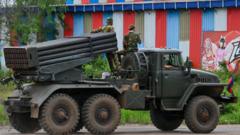Thailand and Cambodia are set to engage in peace talks in Malaysia on Monday following four days of intense military clashes that have claimed the lives of at least 33 soldiers and civilians. The situation escalated after fighting erupted on July 24, leading to the displacement of thousands from both nations. In response to the conflict, U.S. President Donald Trump intervened, speaking to the leaders of both countries and urging an immediate ceasefire before any trade discussions can take place.
Thailand's acting Prime Minister Phumtham Wechayachai will lead the delegation to Malaysia, where he is expected to introduce a framework for dialogue. Cambodian Prime Minister Hun Manet has also confirmed attendance, having already shown willingness for a ceasefire, as his military continues to struggle against Thailand's artillery. Despite the ongoing shelling, Trump's proactive approach has prompted both nations to acknowledge his mediation efforts.
Trump's calls for peace are particularly pressing, as he has linked the resumption of trade negotiations to the cessation of hostilities. From August 1, new tariffs of 36% on goods from both Thailand and Cambodia will come into effect unless a ceasefire accord is reached. While both countries blame each other for the outbreak of violence, the historical context of their border disputes adds complexity to the current situation. As the world watches, the priority remains on achieving stability and protecting civilian lives as discussions loom.


















